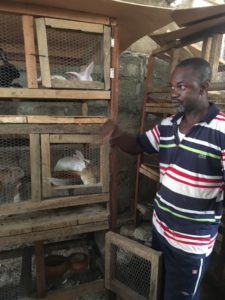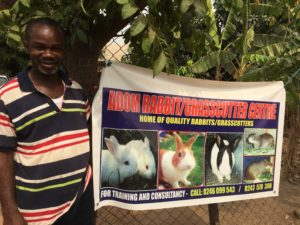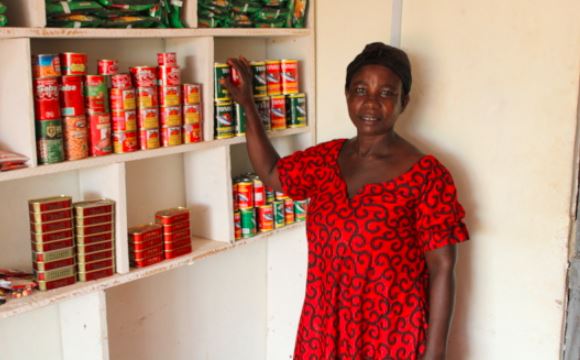Joseph’s Business is Multiplying Like Rabbits!

Joseph showing SHI staff one of his rabbits.
Joseph is a 44-year-old man from the community of Bampenase, in the Ashanti region of Ghana. He is a teacher and serves as a headmaster of Tabre Junior High School. He is married and blessed with four children. While teaching is Joseph’s primary occupation, he also has an interest in small animal breeding, so he started up a rabbit breeding business for additional income on the side. Joseph had been in rabbit production for about a year before he became a client at the Young Adults Training Center (YATC). Joseph started his business in October 2016 with just 3 rabbits, one buck and two does.
Initially, Joseph encountered problems due to the cage he constructed for his rabbits. He and his family had to spend a lot of time cleaning the cages to prevent deadly rabbit diseases. During his meetings at the YATC, Joseph learned how to construct an effective and labor saving cage to keep his rabbits safe from infectious diseases. He tells Self-Help these new cages are saving him money, saying, “My decision to hire additional labour to keep cages clean has been deferred thanks to these ‘self-cleaning’ cages.” Joseph gained additional knowledge on the selection of initial breeding stock, dieting, medication, record keeping, and more has been extremely useful. After the training, Joseph received 3 rabbits as a gift to help him expand his business. Between the three rabbits he already had, the three new ones from the YATC, and the twenty more he purchased to ensure genetic diversity in breeding second-generation offspring, he now has a total of 200 rabbits.

Joseph with his new self-cleaning cages
According to Joseph, “Rabbits can utilize inferior feed and still provide quality meat and fur. Being in the rabbit production business could help me combat malnutrition in my home and my entire region.”
Malnutrition contributes to one third of all childhood deaths in Ghana, and a lack of nutrients – particularly protein – results in nearly two in five children in Ghana being stunted or anaemic. Rabbit farmers like Joseph help nourish their communities by bridging the “protein gap” between supply and demand. Rabbits are among the most economical and profitable of all kinds of livestock because they grow and produce more rapidly than large animals such as cattle, they require less food than poultry and pigs, and can survive on forage alone that humans don’t consume, making more food available to nourish humans rather than animals.
“Moreover,” Joseph continued, “ the business serves as an income source to care for my family.” Joseph is sharing his knowledge and skills in raising rabbits with his students as well. Currently, three of them are into rabbit production. He also went on to thank the YATC team for the unflinching support they have shown to earn him such an enormous success.

Joseph stands with his business sign




